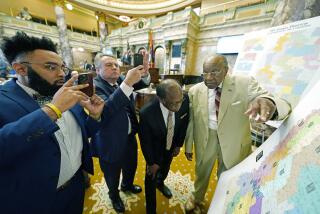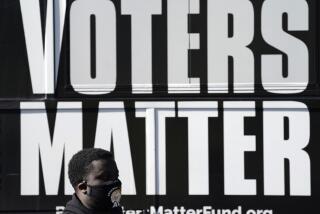Black Lawmakers Press Ashcroft
- Share via
WASHINGTON — End the custom of “racial profiling” that all too often leads to police harassment of innocent African Americans. Reform voting procedures that Democrats claim disenfranchised thousands of black voters last year. Diversify the mostly white federal judiciary.
Those are some of the demands black Democratic lawmakers, incensed by the postelection controversy in Florida, have made to President Bush since he took office.
This week, the Bush administration has stepped up its response. The stakes are high for a Republican president who wants to be perceived as a conciliator but drew less than 10% of the black vote on Nov. 7.
On Tuesday night in a national address, the president vowed an initiative to end racial profiling, and on Wednesday Atty. Gen. John Ashcroft followed up with a visit to Capitol Hill to meet with some of his most vehement Democratic critics: members of the Congressional Black Caucus.
It was the first meeting at the Capitol for the former Missouri senator since he took office following a lengthy confirmation fight in the Senate. In that battle, many Democrats, including members of the black caucus, charged that Ashcroft had a poor record on civil rights and had smeared Missouri Supreme Court Judge Ronnie L. White, who is African American, in a campaign to defeat his nomination to the federal bench.
After his 45-minute lunch meeting with the caucus, Ashcroft emerged with black lawmakers to proclaim that he was ready to forge a cooperative relationship.
“It was a frank, candid exchange,” Ashcroft said. One lawmaker in the room, Rep. Juanita Millender-McDonald (D-Carson), said the attorney general was “on the hot seat.”
Ashcroft, in brief remarks to reporters, said he was “eager” to respond to Bush’s call for recommendations on measures to end racial profiling. That is a practice in which some police rely too heavily on race when, for example, they determine which citizens to stop for questioning.
“We should do what we can to stamp it out,” Ashcroft said.
Millender-McDonald said she pressed Ashcroft for a speedy review of racial profiling, which she said is a major concern in Watts, Compton and other areas she represents.
Ashcroft also addressed concerns the lawmakers raised about allegations of voter intimidation and other problems in Florida that may have depressed the black vote. He said he told them that he was committed to “elections of integrity” and that he considered both voter fraud and disenfranchisement “very serious issues.”
Lawmakers said Ashcroft was also pressed on whether he would support the renomination of White to the federal bench (the Senate rejected him in 1999) and the permanent nomination of Judge Roger Gregory to the U.S. 4th Circuit Court of Appeals, based in Virginia. Gregory, the first African American to serve on that circuit, was given a temporary appointment by President Bill Clinton before the former president left office.
According to Rep. Elijah E. Cummings (D-Md.), Ashcroft said he had not changed his negative opinion about White but would defer to Bush’s judgment. Cummings also said Ashcroft indicated “he did not have a problem” with the appointment of Gregory.
Overall, Cummings said, Ashcroft “said the right things. The question is not what you say but what you do.”
Ashcroft is not the only Republican who is seeking to improve the party’s standing with blacks.
Rep. J.C. Watts Jr. of Oklahoma, the only African American Republican in Congress, on Feb. 23 announced an effort that includes a trip to Africa to discuss free trade, development of democratic institutions and economic development; a review of possible steps to help historically black colleges and universities; and a new push for government aid to faith-based programs, many of which serve predominantly black urban neighborhoods.
For Tuesday’s address, Bush seated Philadelphia Mayor John F. Street, an African American Democrat, at the side of First Lady Laura Bush to promote the faith-based initiative that he also backs.
In addition, House Speaker J. Dennis Hastert (R-Ill.) has pledged to form a bipartisan select committee to investigate and recommend electoral reforms. Rep. Roy Blunt (R-Mo.), a Bush ally, is expected to head the panel. But Democrats, impatient with the lack of movement on the issue, have already named their own election reform task force. It is headed by Rep. Maxine Waters (D-Los Angeles).
What’s more, a spate of legislation has been introduced to remedy perceived problems in the voting system. The latest was announced Wednesday by Reps. Steny H. Hoyer (D-Md.) and Stephen Horn (R-Long Beach). Their bill would seek to phase out punch-card balloting systems of the sort that made Florida’s dimpled chads famous.
Horn said he wanted to ensure “we never repeat the chaos of the past election.”
More to Read
Get the L.A. Times Politics newsletter
Deeply reported insights into legislation, politics and policy from Sacramento, Washington and beyond. In your inbox twice per week.
You may occasionally receive promotional content from the Los Angeles Times.










